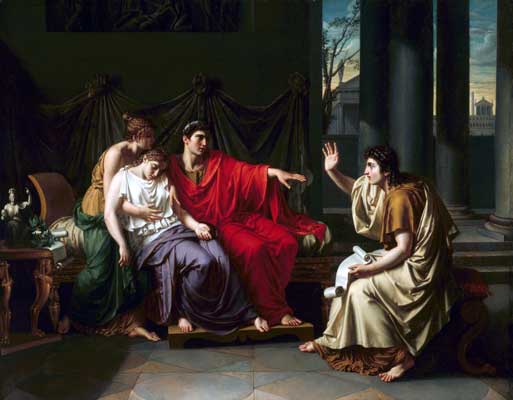Patrick Guinan
Chicago, Illinois, United States

“Arma virumque canto” (“I sing of arms and of a man”)
Virgil (Publius Vergilius Maro 70 -19 BC), the greatest of the Augustan poets, was born in a village near Mantua and studied philosophy and rhetoric in Milan, Rome, and Naples. His literary career benefitted from the support and patronage of the wealthy Maecenas and the powerful Octavian Caesar, the future Emperor Augustus. He traveled widely about the Mediterranean, but was basically a retiring person who periodically would return to his rural birthplace for peace and tranquility. His first major works were the Bucolics (Eclogues) and the Georgics, poems about rural life and farming. Then he achieved immortal fame with his Aeneid, in which he tells of Aeneas escaping from burning Troy, undergoing many adventures on land and sea (including his dalliance with Dido in Carthage), but being impelled by destiny to set sail for Italy—there founding the city that became the master of the world. Virgil became a great favorite of Augustus, who approved of the Aeneid as appropriately extolling the glory of Rome and legitimizing its link to ancient Greece and Troy.
Virgil’s connection to medicine is tenuous, but then no formal medical education existed, and most physicians in Rome were of Greek origin. His writings suggest that from his rural years and later travels he had acquired some knowledge of horticulture, herbal medicine, epidemics, and veterinary medicine. Thus at one point he describes how sheep following shearing would respond to a combination of olive oil, sculpture, pitch, and hellebore. From his battlefield experience he learned about the management of trauma, specifically penetrating injuries by spears and arrows, advising they should not be forcibly removed lest the trauma extend and the patient exsanguinate. His description of Aeneas’ own arrow wound was interesting in that surgery was of no avail but that dittany, possibly an anti-hemorrhagic agent, cured the great warrior.
Virgil’s influence on future generations was enormous and remains so to this very day, in literature and in the arts. Dante describes him as his guide into the Underworld, and many artists have imagined scenes from his poetic life.
References
- Dircks, J. Virgil and Medicine. JAMA 1981;248:1326, Sept 18.
PATRICK D. GUINAN, MD, MPH, is a 1962 graduate of Marquette University School of Medicine. The author went on to obtain a graduate degree in public health from Columbia University in 1965. He is presently a clinical associate professor in the department of urology in the college of medicine at the University of Illinois at Chicago and serves as chairman of the board of the Hektoen Institute of Medicine.

Leave a Reply